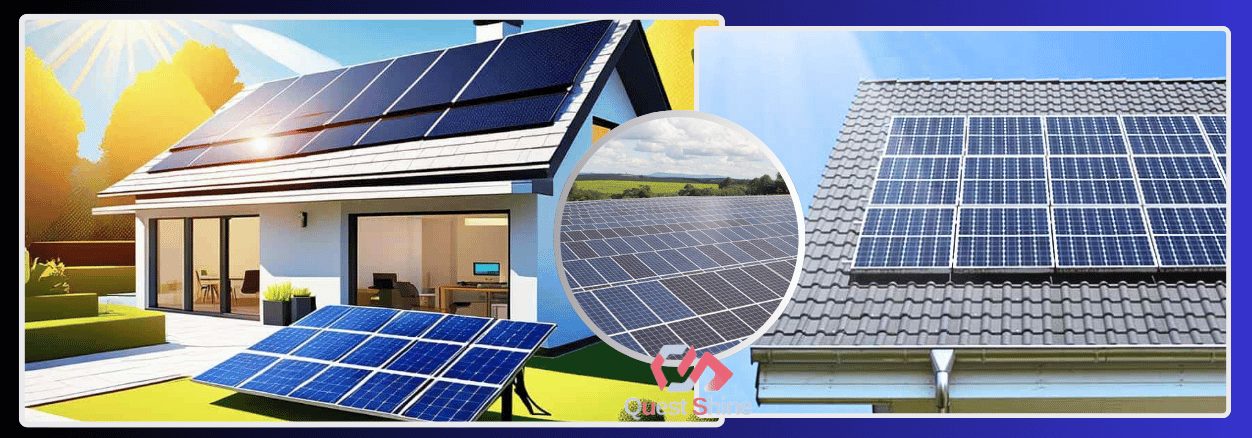A solar rooftop system is a power generation system that is set up on the rooftops of residential, industrial, and commercial buildings to produce clean energy. The solar panels installed on the rooftop harness energy of the sun to produce electricity that offers an eco-friendly alternative to existing conventional power sources.
Major components involved in a solar rooftop system:
- Solar Panels: These panels made up of multiple silicon cells are the most important components that capture the sunlight and produce DC direct current.
- Inverter: it converts the direct current produced by the solar panels into alternating current AC power that is in use for majority of the devices and appliances.
- Mounting: The solar panels are needed to be mounted on the rooftop in an effective manner to produce maximum energy possible. The mounting structure may be fixed or can be designed for a tracking system depending upon the site requirement.
- Charge Controller: The main purpose of a charge controller is to regulate the electricity flow between the solar panels, inverter, and battery backup in off-grid and hybrid systems.
- Battery: It is main component in an off-grid system, where the excess amount of electricity produced after the usage is stored for backup during power outages or when the solar panels are not able to produce required electricity.
Factors affecting solar rooftop system generation
- Solar radiation – The exposure of sunlight plays a vital role when it comes to a solar rooftop installation. The system is considered feasible where there is adequate amount of sunlight available round the year for enough solar power generation for the house and commercial owners. Depending on the amount of daylight it be can be derived that how many solar panels will be required to satisfy the electricity consumption with a solar rooftop system.
- Property Configuration – The layout of the property also affects the solar rooftop system in many ways. The solar panels are to be inclined in a specific angel to receive maximum amount of radiation from the sun during the daytime. If there is any obstruction such as grills or pillars, it may result in reduction of electric production efficiency.
- Surrounding environment – The area surrounding the proposed site is a vital factor to decide it is feasible to install a solar rooftop system or not. For an instance, if there is a high-rise complex next to the proposed site or other obstructive thing that may result in shadow on the solar panels minimizing the production efficiency, then it is a considerable factor.
- Climate condition – Climatic conditions are directly related to the production of solar power for a solar rooftop system. If there is excess rainfall then it may reduce the production capacity and eventually the life of solar panels, whereas if the site is exposed to heavy ice falls it may even damage the solar panels physically. So it is a primary need to analyze the climatic conditions of the proposed site before installation.
How much amount is saved from rooftop solar panels in practical circumstances?
It is definite that there are multiple benefits of using solar power, but still the question arises in the mind of people whether solar rooftop system save money? The answer is a big Yes. It is sure that the initial investment may seem a bit expensive, but it will benefit the owners of the installed rooftop system as a whole in future.
It is a long-term investment and involves minimum or no maintenance due to less operational issues. The return-on-investment is around 5-6 years depending on the operational conditions and environment. The break even may result in an extended duration but there is an effective reduction in the electricity bills instantly.
Let us consider a practical scenario of a certain amount saved using solar rooftop system:
If there is a requirement of 400kwh/month in a rooftop project and a 5Kw solar generation plant is installed at that site.
- The monthly usage of the site is 400kwh.
- Average electricity cost per unit: estimated @ Rs. 7 varies as per the electricity suppliers.
- Cost of electricity per month: Rs. 2800/ month.
- Average units of power generated from a 5Kw rooftop system: 600 Kwh/ month.
- Additional power generated per month = 600-400 = 200Kwh.
- The revenue will be generated by net metering provided by the electricity board for an additional 200 Kwh generated by the 5Kw rooftop system.
As per the reports, the rooftop solar generation system owners are assumed to save a high percentage of money from their monthly electricity bill savings. Also the electricity price hike in future by the electricity supplier will also not affect the individuals who have installed a solar power rooftop system that is generating clean and green energy.





